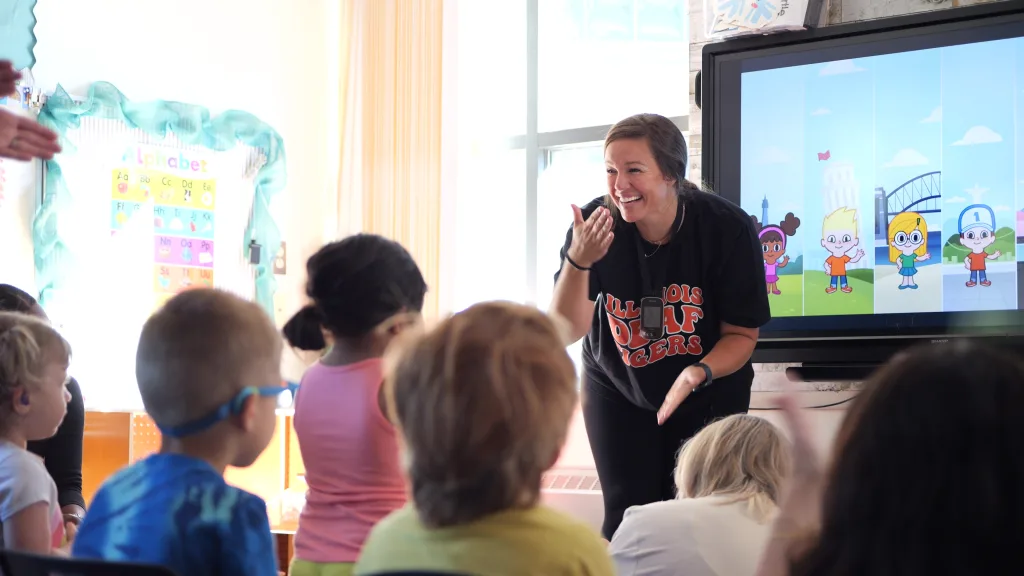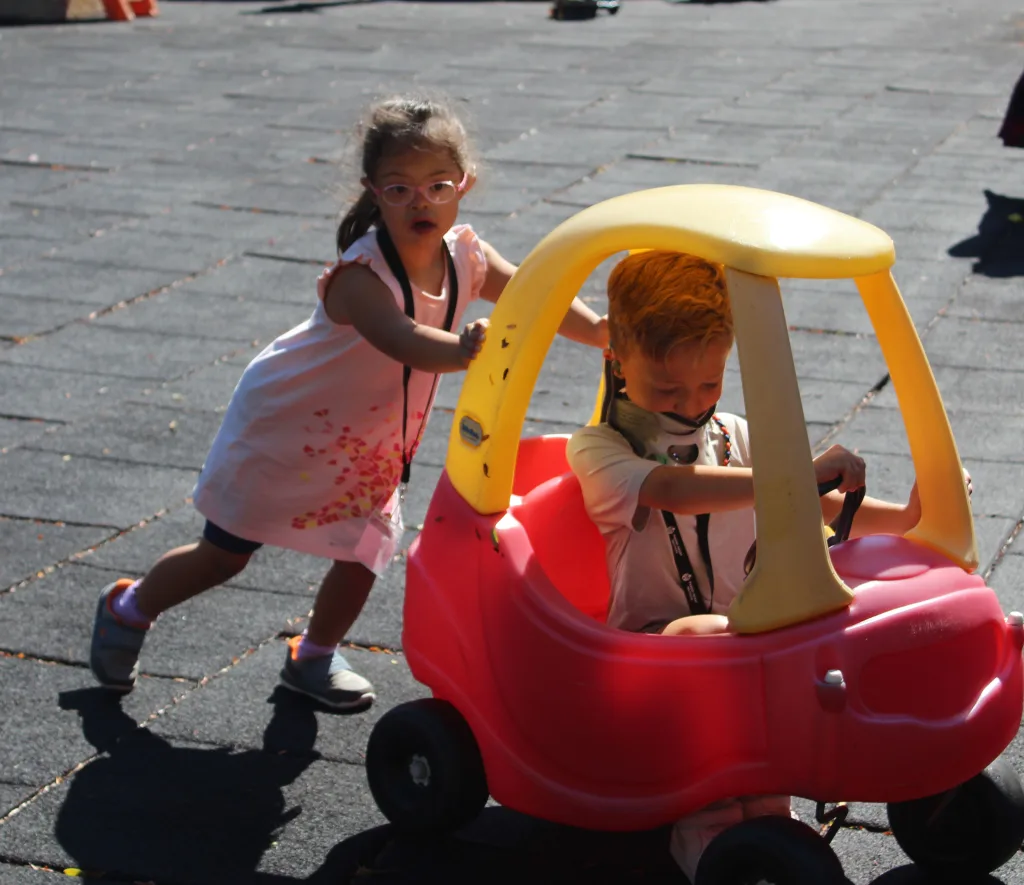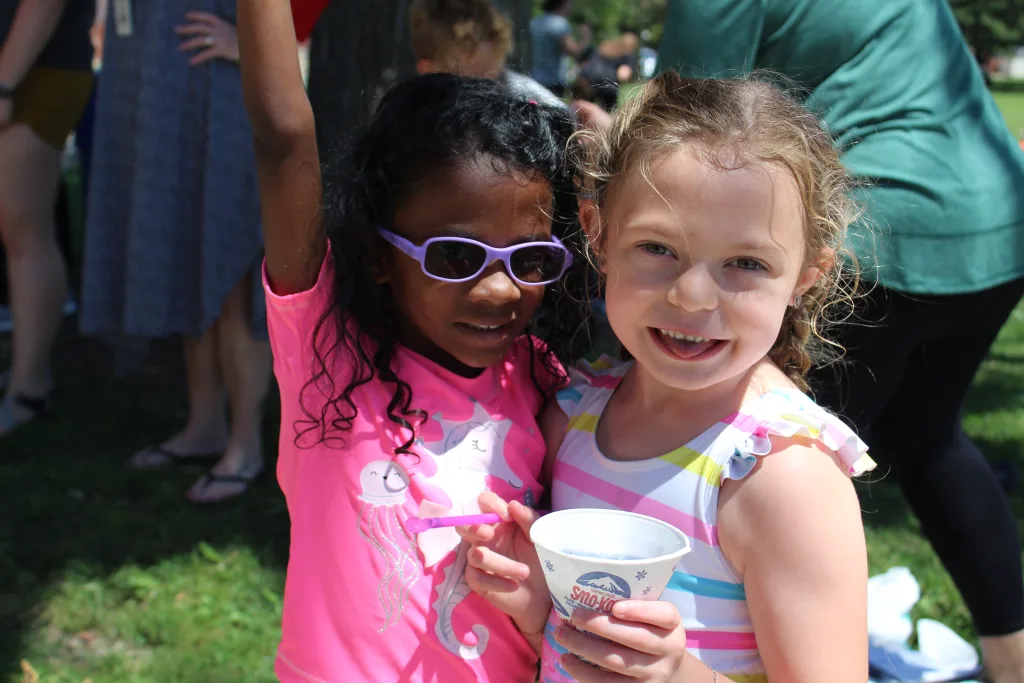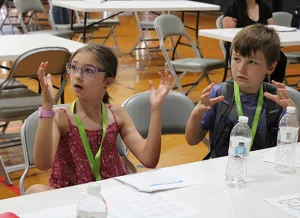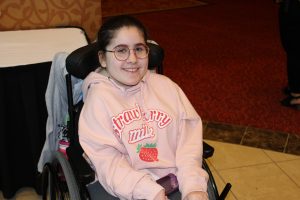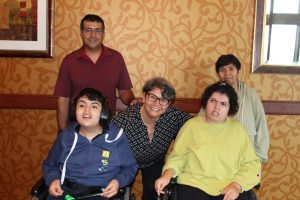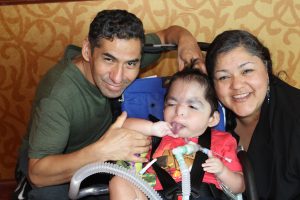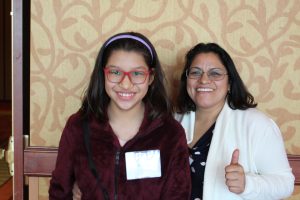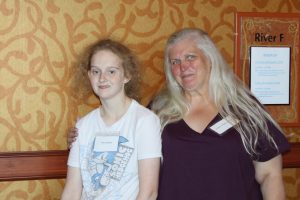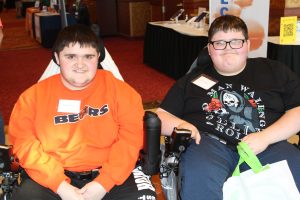Annual Illinois Statewide Transition Conference Maps Out Routes to Adulthood
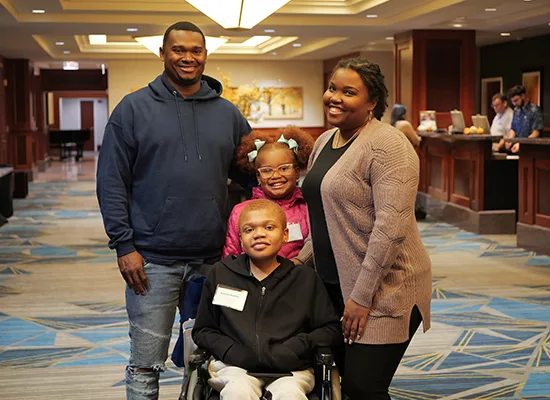
The annual Illinois Statewide Transition Conference provides valuable opportunities and resources to help youth and young adults with disabilities navigate the transition to adulthood.
Turning 18 is a major milestone. For Brenton Braxton and his family, they approached it with a mix of excitement and many questions about the future.
What benefits can Brenton qualify for as an adult? What should they know about guardianship and power of attorney?
Brenton has Duchenne muscular dystrophy, a genetic disorder that causes his muscles to weaken over time.
“When Brenton was first diagnosed when he was 7, these things that are being presented to us now – at that time, we had no idea that we’d be able to be at this place. So, that’s why my word I keep using is a sense of excitement because… Brenton’s still thriving,” his mom, Veneise, said.
Brenton is now a senior in high school with a strong interest in sports and a desire to go to college and “live life to the fullest.”
To help Brenton and his family prepare for what’s next, their Division of Specialized Care for Children (DSCC) Care Coordinator recommended they attend the Illinois Statewide Transition Conference.
The annual event provides valuable resources and information to help youth with disabilities and their families navigate the transition to adulthood.
“One of the major reasons why we wanted to attend this conference is that we wanted to get in the room with the resources. We wanted to get to the people, talk to the people, engage with the people that can say, ‘Hey, here’s what your child qualifies for. Hey, try this program for him, do this, go down this avenue,'” Veneise said.
“You just really want to have your feet grounded in knowing what’s getting ready to happen.”
The Braxtons were among nearly 450 people who attended the 19th Illinois Statewide Transition Conference, titled “Stepping Stones of Transition,” on Nov 7-8, 2024, at the Crowne Plaza Hotel and Convention Center in Springfield.
The transition conference brings together youth with disabilities, parents, caregivers, vocational professionals, healthcare professionals, educators and more.
Youth with disabilities and their families can network and find answers to common questions about the transition to adulthood, including:
- What happens after I leave high school?
- How do I sort through the maze of resources?
- What steps can I take now to prepare for upcoming changes?
- What skills are important for me to develop?
“Here we all are in one space.”
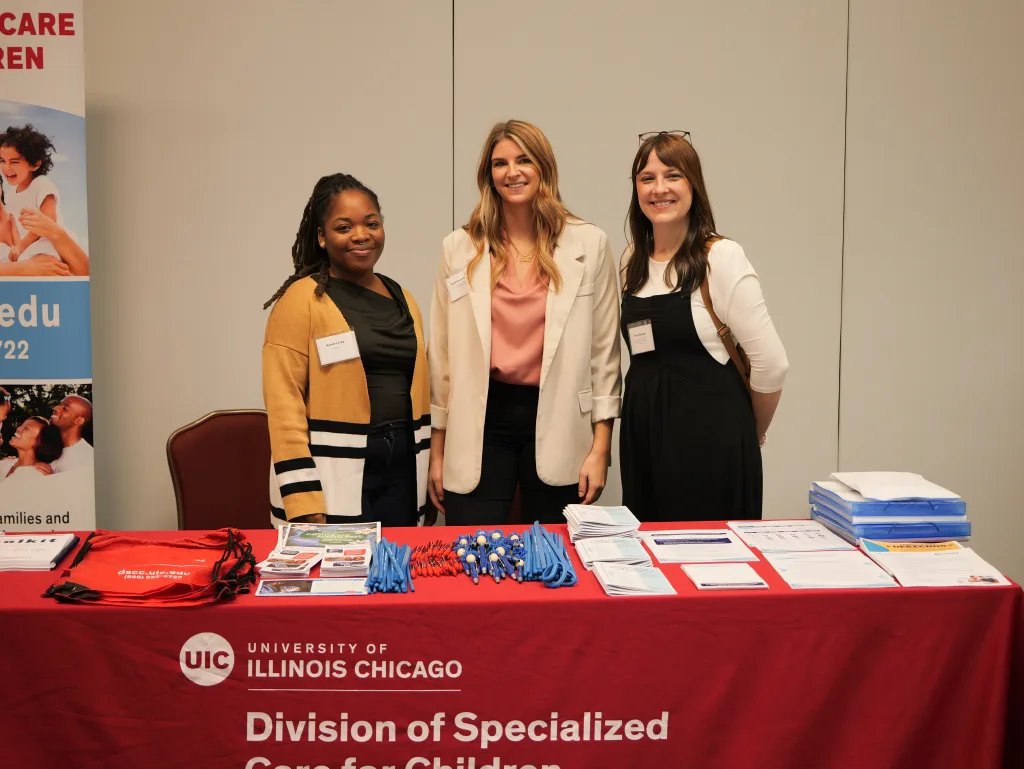
DSCC Home Care Family Outreach Associate Erica Stearns describes the annual conference as “a dream come true.”
Erica is the parent of two children enrolled with DSCC. Erica also has lived experience as an individual with disabilities.
“I was talking to another adult with disabilities before this interview, and it dawned on me, I didn’t grow up having this,” she said.
“To have an event where everyone is coming together for a similar purpose related to our children and their disabilities is incredibly meaningful, and it’s unique in that here we all are in one space.”
Erica highlighted the importance of ensuring youth and young adults have access to the information and resources they need as they transition to adulthood.
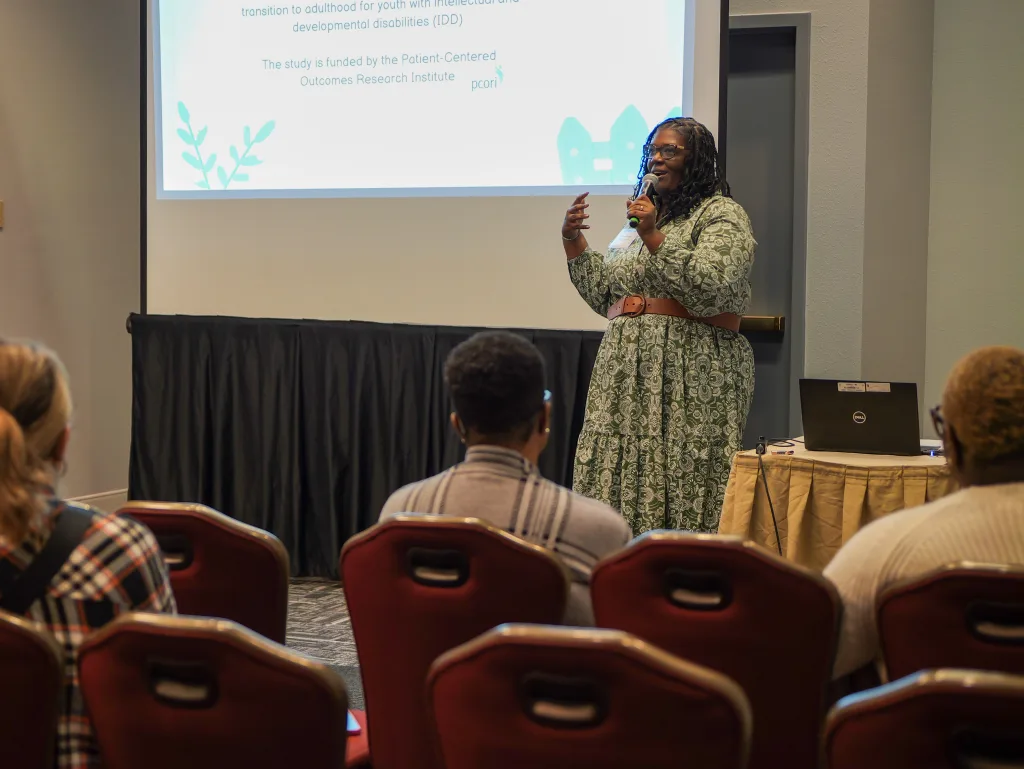
“It is abundantly clear that while we know that there are certain steps and certain paths that individuals with disabilities can take as they navigate their entry into adulthood, the information to prepare both their families and themselves for that is very challenging to find,” she said.
“I think most families feel empowered with knowledge. And I think that’s what this conference provides families is information, knowledge, tools and resources.”
DSCC helps sponsor the conference and serves on its steering committee. DSCC also provides financial support to help participant families attend the conference.
Claire Cook is DSCC’s Title V Transition Specialist and co-chair of the Transition Conference’s Steering Committee.
“Several families came back from last year,” said Claire. “We had about 20 or so individual families from DSCC, five of which were primarily Spanish speaking and several of our transition-age youth.”
“A lot of opportunities, a lot of information.”
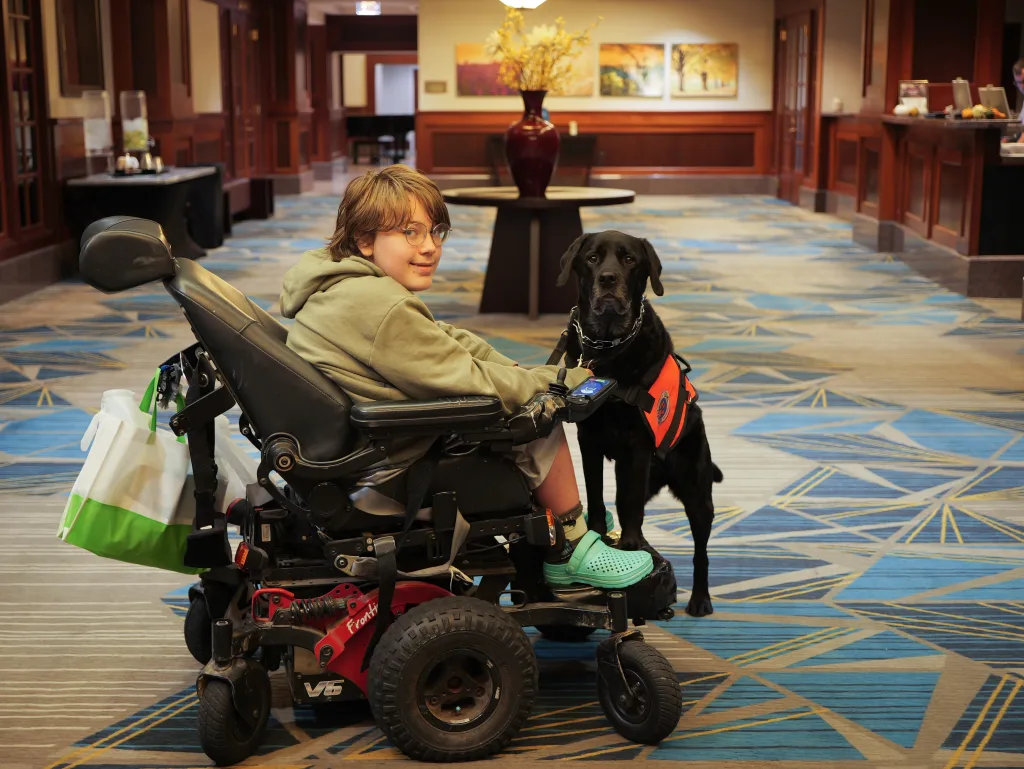
Jani, 14, attended the conference with his mom, Aimee, and sister, Grace.
Jani has spinal muscular atrophy (SMA). He first enrolled with DSCC when he was diagnosed with SMA, close to 12 years ago.
Jani described the conference as a positive experience with valuable information. He and his family gained resources, discovered new opportunities and made connections.
“We had a very nice family that was sitting by us (at lunch), whose son had a similar disability. It was just nice to talk to them and hear their story,” Jani said.
When asked if he would recommend the conference to other young adults, he said, “You should definitely come because it has a lot of opportunities, a lot of information. It’s just good to come to understand what’s going to happen, what they want to do later in life.”
After high school, Jani plans to go to college and become a teacher.
“I want her to be strong, and I want her to be confident.”
TaLeah, 17, attended the conference with her mom, Tamara. TaLeah first enrolled with DSCC 15 years ago, when she was diagnosed with hearing loss.
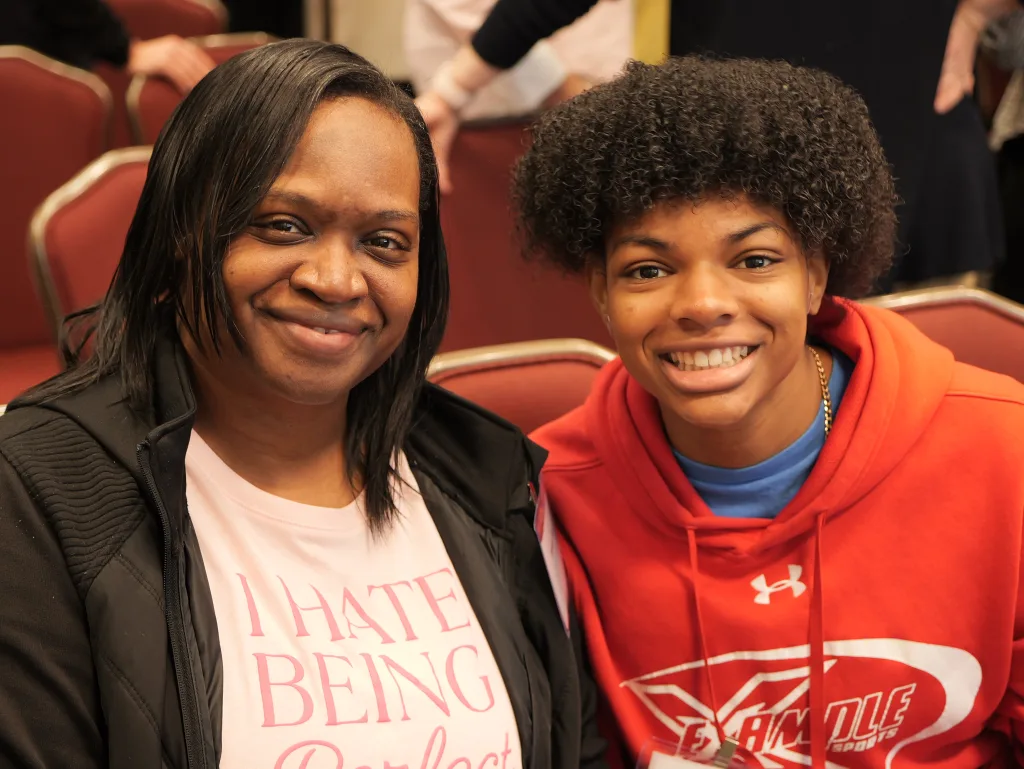
She is an accomplished basketball player who plans to go to college, play basketball and be successful.
“I want her to be strong, and I want her to be confident,” said Tamara.
“I want her to continue to advocate for herself and others. And I think she’s doing a good job thus far.”
Tamara said she is trying to give her daughter the best tools and equip her the best way she knows how.
“All this information is very helpful and hopefully it’ll help build her up.”
Brenton Braxton said the resources and knowledge his family gained at the conference will help him achieve his goals.
“I think some things from here that I learned is that not only I’ll still have my independence, but I can also use my parents to help me in my journey and to living it to the fullest and doing all the things I want to do,” he said.
On turning 18, he said, “It’s a big step, but I feel like with the support from my family and people around me, it’ll be good.”
Save the Date for the 2025 Transition Conference
The 2025 Illinois Statewide Transition Conference will take place Oct. 30-31 at the Crowne Plaza Hotel and Convention Center in Springfield.
To learn more about how to support youth with special healthcare needs during the transition to adulthood, contact DSCC at (800) 322-3722 or dscc@uic.edu.
For more information about the Transition Conference, visit www.illinoistransitionconference.org/.
Check out our Facebook page to see a photo album with more photos from the 2024 Transition Conference.
Families Gain Expert Guidance and Support Network for Raising Children with Hearing Loss
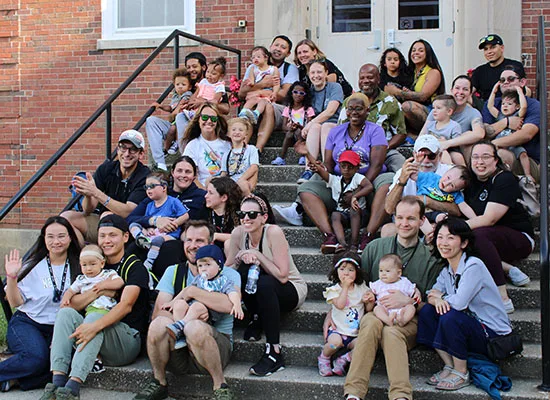
The 2024 Institute for Parents of Preschool Children Who Are Deaf or Hard of Hearing provided education and connection to 27 Illinois families.
Marcellus Weldon and his daughter, Mariana, were born with the same rare genetic disorder called Treacher Collins syndrome.
It affects the development of the head and face, including the ears.
“We don’t have any ear canal or any ear at all, on both sides. So, we’re profound to moderate deaf. It just happens at birth,” Marcellus explained.
He uses the analogy of a car to describe living with their disabilities.
“Growing up, I was the passenger, and my mother was the driver because she also has the same condition as me,” he said.
“Now that I’m the parent, I’m the driver and Mariana is the passenger. And we have to go through hills, valleys, twists and turns together. And there’s going to be things that I just can’t do with her.”
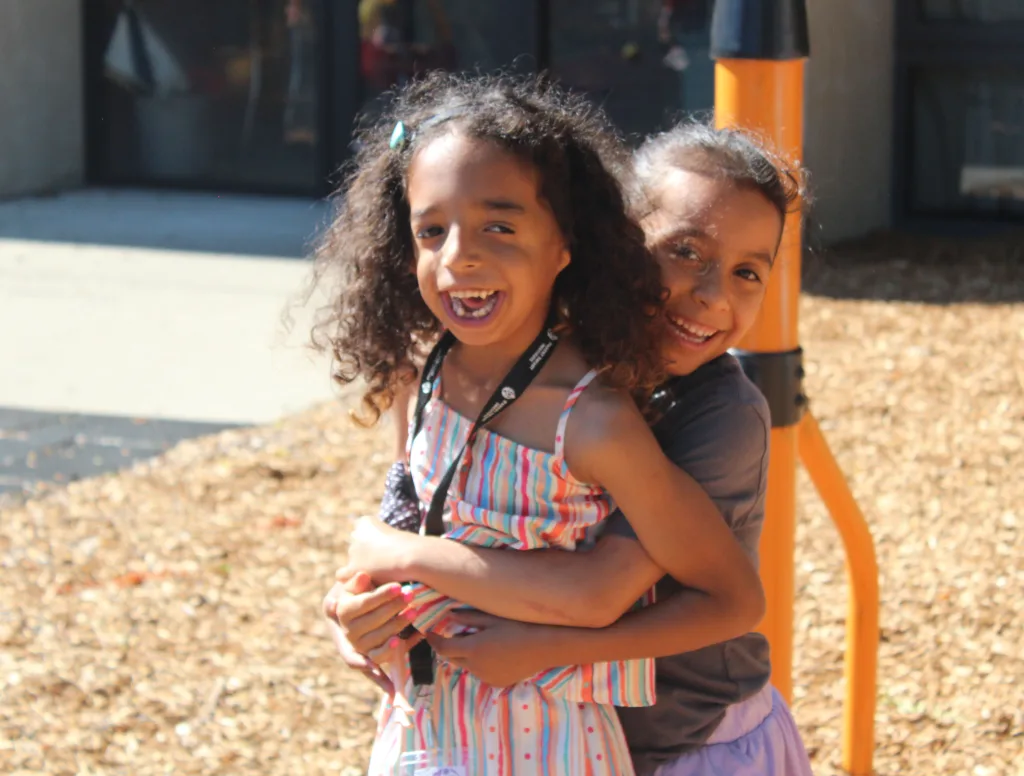
The desire to give Mariana, 6, the knowledge and tools necessary to be her own “driver” led the Weldon family to the 2024 Institute for Parents of Preschool Children Who Are Deaf or Hard of Hearing.
The Institute is a free, annual program for parents and caregivers of children ages 6 and under who have an identified hearing loss. It focuses on helping families find answers, build connections and access resources all in one place.
During the four-day program, Marcellus watched Mariana bond with other children. He also learned more about his family’s type of hearing loss, education options and how to best support Mariana through school and beyond.
“It’s nice for me to see her thrive not only academically but socially, and she’s just been blossoming like no other. And that’s a beautiful thing to see,” he said.
“She has a community. She has somewhere to go,” Marcellus continued. “She has resources that I never had — someone to fill up her tank, using that analogy.”
The Weldons were among 27 families from all over Illinois who attended this year’s Institute from June 13-16 on the Illinois School for the Deaf (ISD) campus in Jacksonville.
The University of Illinois Chicago’s Division of Specialized Care for Children (DSCC) supports the Institute, along with other sponsors.
“Parent Institute for me is exactly the soul and the heart of what DSCC’s mission is. You have our mission statement as partnering, helping and connecting. And this program is the epitome of what that is,” said Violet Wiker, DSCC’s Family Liaison who helps families enroll and prepare for the Institute.
Continue reading and watch the recap video below to for powerful parent and staff testimonials from the 2024 Institute:
Expert advice and guidance
The Institute provides valuable education and networking for children with hearing loss, their parents/caregivers and their siblings.
Participating parents and caregivers attend daily lectures by experts in the field to learn about raising a child with hearing loss. They also meet in small groups with professionals to discuss specific concerns and connect with other caregivers.
“They go through classes, they have educational experiences, they get to make friends that are people that are living their journeys and then interacting with the professionals that can give them great advice and guidance and expertise on how to go forward from here,” Violet said.
The children with hearing loss attend classrooms with experienced teachers of children who are deaf or hard of hearing. They play with one another and often develop deep friendships.
Each child also has the opportunity to receive hearing, vision, psychological, speech, language and educational evaluations.
“All of those are these amazing comprehensive reports that (families) can take with them out into their communities where they need those reports and those recommendations,” Violet said.
Siblings also attend and stay with their families in the ISD dorms. The siblings have their own teachers and take part in fun recreational activities.
“No one ever leaves disappointed and without fail, by the time we depart at the end after the graduation ceremony, people are always very grateful, glad that they came and they have taken away a lot of knowledge and information,” said Angela Kuhn. Angela is an ISD administrator who serves as the director for the Institute.
“They have really a connection with the staff here at the School for the Deaf and DSCC employees that lasts for a lifetime.”
“We understand each other”
Mayra Villarreal attended the Institute looking for knowledge, community and others who would understand her family’s situation.
Mayra’s daughter, Miliani “Mili” Carmona, 6, has a rare genetic mutation that causes progressive hearing loss. It also causes retinitis pigmentosa, a condition that affects the eyes and leads to gradual vision loss, as well as seizures and other neurological problems.
The Institute helped Mayra understand how Mili perceives the world.
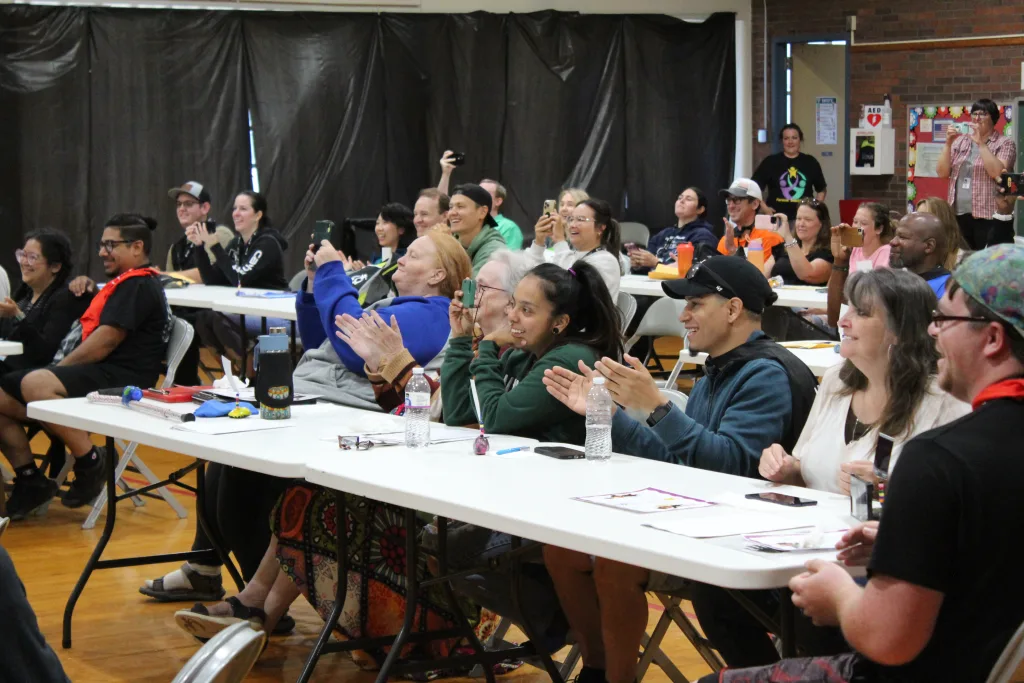
“The first thing that really hit a ‘wow’ moment for me was when we were doing the educational part about the hearing impairment, and they played that hearing loss simulation video. And hearing where she was, it was just surreal because you don’t really get it. You could try all you want to understand what your child’s going through, but you don’t get it unless you’re in it…” she said.
“It broke my heart. But it also made me understand her more… and see why things have been so hard for her.”
Mayra also found understanding for herself from both the Institute staff – many of whom have hearing loss themselves or are related to someone with hearing loss – and the other families.
“Everybody’s connected in some sort of way, and that’s why I feel like everybody here has such a passion for it,” Mayra said. “I’m lucky enough to take back these relationships that I have built with these parents because we might not be on the same journey, but we understand each other.”
Parent Megan Andresen and her 5-year-old son, Victor, are both deaf from Waardenburg syndrome.
“Coming into this I wanted to learn about my son’s behavior. Then I learned about implants and cued speech and different things, and it really opened my eyes.,” she said.
“The thing I think I’ll take away is as parents, whether we’re deaf or hearing, we have that same commonality because we do have deaf children, and it’s not different people in different groups,” she continued.
“It’s everybody really together, all coming here for the betterment of their children and to learn about their children.”
Sarah Dupuis’ daughter, Kimberly Pham, is 5 and was born with Down syndrome and mild to moderate hearing loss. As a special needs parent, Sarah said the opportunity to relate with other families is invaluable.
“Having a kid with special needs is so isolating. And to just be here with other families that face the same struggles… You’re sharing all of these stresses together, and it’s so cathartic,” she said.
Sarah and her husband, James Pham, also enjoyed the opportunity to immerse themselves in the classes and conversations without the distractions of day-to-day life back home.
“When you’re a parent of a child with special needs, you’re so overwhelmed all the time. And we just need resources, and it’s so hard to figure all those resources out by yourself,” Sarah said.
“You can come here, you can get the camaraderie with the other parents. You can learn about all kinds of things that you didn’t know about before. And it’s just so great. So, we’re really grateful for this.”
Inclusion and lifelong friendships
Lauren and Jonathan O’Brien traveled to the Institute with their daughter, Alannah, 7, and son, Josiah, 4.
Josiah has a genetic deletion on chromosome 15, which causes global delays with a bilateral hearing loss.
Alannah loved the sibling program and made a best friend with another girl in her group. Lauren and Jonathan also befriended the child’s parents.
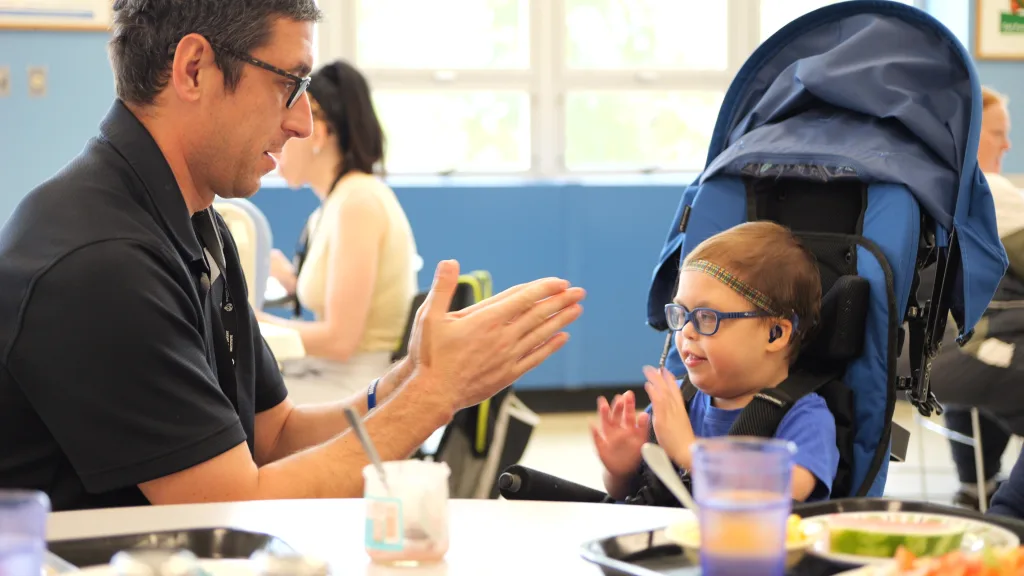
“I think the most important thing was for us to find a community because we are blessed to be in a really good school district with a deaf and hard-of-hearing community. But there’s not always kiddos that also have all their diagnoses going on. And so here, you not only have the Deaf culture, but there were other kiddos that had similarities to him cognitively,” Lauren said.
“It’s just been amazing for us to have the parent side of it and then to know that (Josiah)’s being seen by all of these top specialists in the field. And then (Alannah)’s having the time of her life with other siblings. It’s so special for all of us to be here together and to get this experience.”
Ramie Nauman’s daughter Alivia is 6 and has a fluctuating hearing loss along with other health conditions. They attended the Institute along with Alivia’s big sister, Malley, who is 19 and studying in the deaf and hard of hearing education program at Illinois State University
Alivia is mostly non-verbal and communicates through sign language. Up until attending the Institute, Ramie and Malley were the only ones who signed with Alivia outside of her school.
“She doesn’t have a lot of people to actually talk to all the time. So, we wanted for her to be able to talk to other kids and other adults. And we’ve heard about the school (ISD) and that everybody signs, and so, she’s been super excited,” Ramie said of preparing for the trip to ISD.
Alivia’s excitement only grew once she arrived on campus and could sign with everyone she met.
“I love to see her in her element, talking to the cook and talking to everybody. So, I think that’s been really fun to watch her be able to communicate with everybody here, which she’s never had before,” Ramie said.
“I feel like everything’s just way less scary because she knows, ‘OK, I can talk to anybody,’” Malley added.
Alivia’s Institute classmate Kingslee also benefited from that immediate sense of belonging, his grandmother Constance said.
Back home in the Collinsville area, Kingslee was the only deaf child in his class. Therefore, his exposure to sign language and communicating with other kids was minimal.
During the Institute, Kingslee formed fast friendships and didn’t want to leave his classroom.
“It’s like a family here. Like my grandmother always said, ‘It takes a village to raise a child.’ And I see this here is his village,” Constance said.
To families thinking about attending the Institute next year, Constance has a simple message.
“Come. If this is your state, come,” she said.
Learn more about the Institute
Visit our Facebook page to see an album of photographs from the the 2024 Institute.
In addition to DSCC, the following organizations supported this year’s program:
- Department of Human Services – Division of Rehabilitation Services
- Illinois School for the Deaf
- Illinois State Board of Education
- Illinois Department of Public Health
- Ann & Robert H. Lurie Children’s Hospital of Chicago
For more information about the Institute and how DSCC supports children with hearing loss, call (800) 322-3722 or email dsccinstitute@uic.edu.
Institute Provides Education, Support and Connection for Families of Children with Hearing Loss
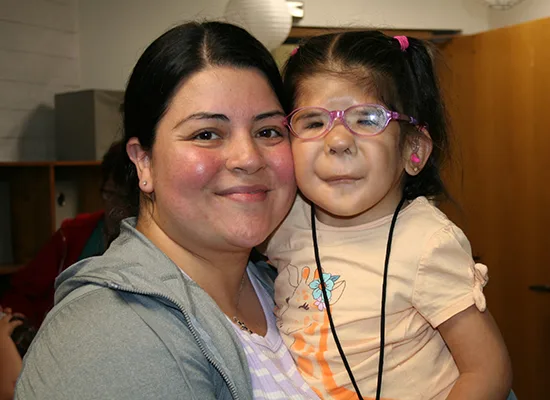
Illinois families gained knowledge and formed priceless relationships during the 2023 Institute for Parents of Preschool Children Who Are Deaf or Hard of Hearing.
The journey to the 2023 Institute for Parents of Preschool Children Who Are Deaf or Hard of Hearing was a mixture of excitement, nerves and some fear for Kelly Lane and Crystal Harris.
When they received the flyer for the free one-week program at the Illinois School for the Deaf in Jacksonville, they were skeptical it would be the right fit for their son, Casper.
Casper, 4, has bilateral hearing loss, epilepsy and a developmental delay.
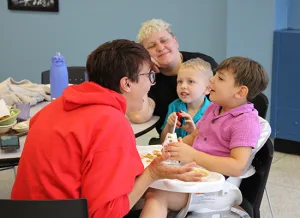
“We’ve been to other events on a smaller scale before that were geared towards families with kids who have hearing loss and felt out of place there because our son also has other disabilities,” Kelly said.
Crystal called the number on the flyer and spoke with Violet Wiker, the Family Liaison for the University of Illinois Chicago’s Division of Specialized Care for Children. Violet helps families enroll in the Institute and addresses any questions or concerns they may have.
Crystal said she talked to Violet for more than two hours.
“She assured me that there were kids of all different learning abilities here, that they would be in a classroom setting… she really sold it to me, really made me feel comfortable,” Crystal said.
She and Kelly then made the trip from Chicago with Casper and his big brother, Courtland. Once they arrived on the School for the Deaf campus, they knew they made the right choice.
“We couldn’t have felt more welcome… We’re used to feeling out of place, so it felt really good to come somewhere and feel normal for once,” Kelly said. “Coming here just felt like going home.”
A total of 22 families from across the state attended this year’s Institute from June 11-16. The Institute is for Illinois parents of children from birth to age 7 who have a significant hearing loss.
Participating parents attend daily lectures by experts in the field to learn about raising a child with hearing loss. Lecture topics include:
- Child development
- Types of hearing loss
- Language development
- Communication choices
- Assistive communication devices
- Deaf culture
- School programming
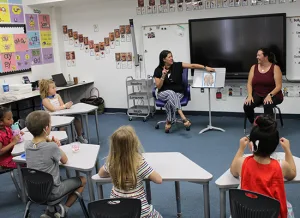
Other activities include meeting in small groups to discuss specific concerns and connecting with other caregivers.
The children with hearing loss attend classrooms based on their age group. Experienced teachers and aides for children who are deaf or hard of hearing oversee these classrooms.
Attending children also can receive hearing, vision, psychological, speech, language and educational evaluations. They also get to play with other children who have a hearing loss.
Siblings also attend the Institute and participate in fun and educational activities, including art projects and learning to sign.
There is no cost for families to participate in the Institute. Meals and housing are provided at no charge.
“One place, all questions answered”
Laura Colic’s son Liam is almost 5 and profoundly deaf. He wears bilateral cochlear implants that he’s had for a little over a year.
“I just wanted to get as much information to make sure that we give him all the opportunities, especially since he’s starting kindergarten in the fall,” Laura said of her decision to attend.
One of her favorite experiences from the week was listening to a panel of Deaf adults share their experiences.
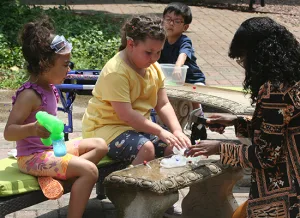
“When you’re in it with little ones, it’s hard to see what that may look like as they grow up. I love the exposure to just the Deaf culture. Even Liam has loved that. He has been so excited to see adults with cochlear implants” she said.
Laura also praised the knowledge of the team of professionals who spoke with families and provided evaluations for the children.
“Their knowledge is phenomenal, and I feel like it’s golden,” she said.
“I wish I could take them with me back home and just create this bubble for Liam. But I’m happy to take the knowledge that they’ve given me, the assessments they’ve provided, the one-to-one time with each of the different people that have worked with Liam and assessed Liam. The evaluations are just phenomenal.”
Sylvia Gavina is mom to 4-year-old Freddy. She appreciated the opportunity to see and understand what Freddy’s hearing loss truly means for him.
“Being able to meet with the professionals and learn what we did in a week takes it to a different level. At home, you might have an appointment one week and then wait three months for the next one. Here, we are leaving with a baseline. One place, all questions answered,” she said.
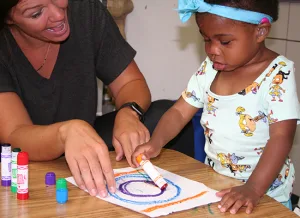
Sheryl Stone’s daughter Nevaeh is 4 ½ and attends the Illinois School for the Deaf. She said the Institute gave her an eye-opening look into how Nevaeh experiences the world. An education session on the Deaf experience helped her understand better what it’s like to not hear and to rely on lip-reading, sign language and other communication methods.
Eddi Fowler said she also learned how to better communicate with her 2 ½-year-old daughter, Kacey. In addition to learning American Sign Language (ASL) and cued speech, Eddi learned more about available resources and how to advocate for Kacey.
“I learned a lot, and I have a lot to take back home with me. I’ve got gigantic paperwork that’s going to help Kacey and my little family throughout the year with her education needs, her hearing loss, her autism, everything,” Eddi said.
“A community of families”
Three-year-old Christian has hearing loss in both of his ears. His parents Basia and Aaron said watching their son become more social with the other children was especially rewarding.
“He’s more expressive. With all the signing and the cued speech that we’re integrating, he’s using his hands more, different modes of communication. That’s something that we were really trying hard to get out of him at home and it’s been tough. But he seemed to really just open up to more people and other children as well,” Aaron said.
Sarah Berns attended the Institute with her son, Colsen, and daughter, Evelyn. Colsen, 7, was born with bilateral sensorineural hearing loss. However, his family was not aware of his hearing loss until he was 3 years old.
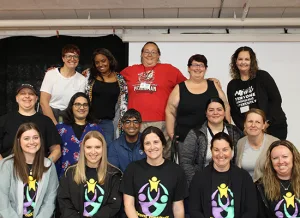
The Institute was the first time he could see other kids with hearing aids and cochlear implants and simply play with them and have fun.
Sarah said she also found a special connection with the other parents.
“I felt like I was all alone. And now I feel like I have a community of families that I can call when I need to talk to them about anything. I also got a lot of information about what my son is going through and what it’s like to be hearing impaired, which is the best connection that I could have with my son, and knowing more about him and what he needs,” she said.
The Institute was also just as valuable for Colsen’s big sister Evelyn.
“She sees that (hearing loss) isn’t something that’s terrible, her brother isn’t annoying, and that there’s this really cool language now that we can have between us that she wasn’t interested in before,” Sarah said. “There’s value in it for her… she has a newfound empathy that she didn’t have before.”
Sarah encourages all families of children with hearing loss to make the trip to the Institute.
“It is life-changing. There are people that value you for who you are, and they are only here to help and give you strategies to help you,” she said.
“A sense of comfort”
After spending a week at the Institute, Kelly and Crystal said they didn’t want to leave.
“We’re not ready to go home. This past week, I’ve felt a sense of comfort that I haven’t felt in a very long time,” Crystal said.
“And that’s saying a lot considering how much information overload has been happening,” Kelly added. “I feel like we should be feeling frazzled and overwhelmed with the amount of new information we’ve gotten, but instead I just feel clarity. I feel clear on where my son’s at, where we need to go, and the options that we have and resources that we have at our disposal.”
Sarah shared a similar sense of peace and optimism for her son, Colsen, after attending the Institute.
“Even though life is not the same plan I thought it was going to be, it’s still going to be wonderful…” she said. “Seeing these other people going through this and through their life, how their life has been impacted by having hearing loss, I realize that (Colsen) really hasn’t lost anything. He is just experiencing it in a different way, and that that’s OK, and that we’re going to be OK.”
Visit our Facebook page to see a photo album with more photos from this year’s program. You can also see videos that highlight different parts of the Institute experience on our YouTube playlist.
The following organizations supported the 2023 Institute:
- University of Illinois Chicago’s Division of Specialized Care for Children (DSCC)
- Department of Human Services – Division of Rehabilitation Services
- Illinois School for the Deaf
- Illinois State Board of Education
- Illinois Department of Public Health
- Ann & Robert H. Lurie Children’s Hospital of Chicago
The 2024 Institute will take place June 13-16. Please see the below flyers for more details:
For more information about the Institute and how DSCC supports children with hearing loss, call (800) 322-3722 or email dsccinstitute@uic.edu.
2022 Transition Conference Prepares Youth With Disabilities for Adulthood
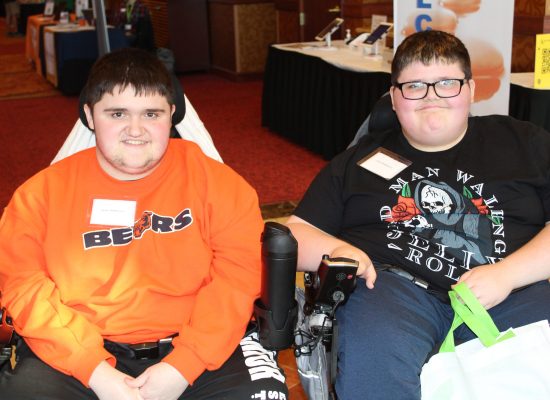
The annual Stepping Stones of Transition Conference gives families and professionals valuable resources and information to support youth on the path to adulthood.
Sixteen-year-old Ayla Etheridge says she’s faced many surgeries and physical limitations throughout her life.
She was born with a spinal lipoma (a mass of fatty tissue) and has experienced nerve damage and scoliosis. At one point, she needed a tracheostomy to breathe.
Ayla now uses a wheelchair and credits her physical challenges with “making my brain better.”
“I always bounce back and don’t want to just sit around and get depressed,” she said.
Ayla is also a careful planner, extremely tech-savvy and loves gaming, character design and writing.
As she attended the Illinois Statewide Transition Conference, Ayla thought more about how these interests and skills will shape her future and career goals.
“I’m very independent and would like to do more things myself,” Ayla said. “This conference has kind of helped me visualize and think about my next steps.”
The 17th annual transition conference, titled “Stepping Stones of Transition,” took place in East Peoria on Nov. 3-4. The conference helps both families and professionals learn about the resources, information and opportunities available for youth with disabilities as they prepare for adulthood.
Ayla and her mom, Rachel, were among nearly 450 people who attended in person.
The University of Illinois Chicago’s Division of Specialized Care for Children (DSCC) helps sponsor the conference and serves on its steering committee.
DSCC also covered the related costs for 34 of our participant family members to attend, including the Etheridges and the Barraza family.
“I am so thankful to DSCC for the fact they covered the cost to be here. That made a big difference in us being able to attend,” Anita Barraza said.
“Education empowers me”
Anita’s son, Daniel, 17, is a DSCC participant. His older sister Diana, 22, left DSCC last summer.
All three attended together along with dad, Jose, and Anita’s mother-in-law, who helped care for Daniel and Diana when they needed a break from conference activities.
“It was great to have my husband be able to be part of the process and that both he and I could listen and take in the information,” Anita said. “(The conference) is also a nice way to spend time together as a family. It’s almost like a mini-vacation for us.”
Anita is an occupational therapist who works with school children, so she understands both sides of the need for information and resources when supporting young adults with disabilities.
“As a parent, we can feel so overwhelmed. Even if help is right there, that reach can be hard to do,” Anita said.
That’s why opportunities to learn about a variety of resources and network with other families and professionals are so important.
“These types of resources educate me on how to best provide for my children’s needs and for their future,” Anita said
Both Daniel and Diana have significant medical needs and are unable to safely live on their own.
Anita says it’s hard to think about, but she realizes must start planning for who can care for Daniel and Diana when she and her husband can no longer do it. Residential placement may be necessary in the future.
The Barrazas also want to learn about possible day programs that can offer one-on-one support to Diana and possible employment options that would work well with her needs.
“Education empowers me to be better prepared to help (Diana and Daniel) have a good quality of life,” Anita said.
“One step ahead”
Anita had told two other DSCC moms about the conference and encouraged them to attend. One of those moms is her friend Yessy Castillo.
Though Yessy’s son, Jacob Ortiz, is only 4 years old, she knew it was important to go.
“I want to be aware of what services are available for Jacob,” Yessy said. “Most importantly, I want to be one step ahead. This conference allows me to get the information on what can benefit Jacob.”
Jacob was born with a cleft palate, an underdeveloped jaw and his tongue pushed back toward his throat. He also had malformations in his hands and feet, and his intestines did not rotate appropriately.
Jacob now has a tracheostomy and depends on a ventilator 24-7 to breathe.
“I appreciate getting the opportunity to meet people and attorneys for advice and support and more legal information on Jacob’s rights,” she said. “If I was not exposed to these events, I wouldn’t know what is available.”
While Yessy speaks limited English, she said the presentations all gave information in a way she could understand.
Melania Tinoco, who also speaks Spanish and learned about the conference from Anita, said connecting with other families at the conference helps her feel more confident.
“It helps seeing we’re all in the same boat and finding out we aren’t alone,” Melania said.
Her daughter Jeny is 14 and has been a DSCC participant since birth. Jeny has Pitt-Hopkins Syndrome, a rare genetic and neurological condition that causes developmental delays.
Melania said the conference has helped her plan for what happens to Jeny if she gets sick and/or can’t take care of her daughter. She also appreciated the breakout sessions on helping youth with disabilities respect their body and feel empowered to say “no.”
“The information has been helpful and inspirational,” Melania said.
Putting information into action
The conference consisted of informative breakout sessions in the areas of employment, education, health care and more.
DSCC participant Vera Lynn Lindquist, 17, and her grandmother, Cheryl Lindquist Calcese, said they enjoyed the “Awareness and Transition Services for Students with Disabilities” session. It gave them helpful information on sex education and tips for building good money management skills.
Cheryl is Vera’s legal guardian. She and Vera planned to start a new budget at home after the conference. Vera will get paid for doing chores, such as cleaning her room, helping with the laundry and feeding her two dogs and cat. She will also get a debit card so she can buy things and track her spending.
Vera has autism, attention-deficit hyperactivity disorder, anxiety disorder from childhood, tinnitus and hearing loss, and seizures.
She enjoys being an advocate, helping others and encouraging everyone to be kind.
During the breakout session, “Your Story Has Power: Great Expectations and Pieces of the Self-Advocacy Puzzle,” Vera stood up and actively participated during the presentation.
Vera and Cheryl hope to attend the transition conference again next year.
DSCC participant Sabrina Doueihi, 20, was among several self-advocates who shared their perspectives during the “Transition Success Stories” breakout session. She is currently a junior at Bradley College, where she is studying criminology. She hopes to go to law school and become a prosecutor.
Sabrina spoke about the importance of staying true to yourself and what you want to do. She also recommended that youth with disabilities focus on what they can do and who can help them achieve their goals.
“Trade stories and network”
For brothers Jaysen and Justen McMenamin and their parents, the transition conference was a good opportunity to plan for life after high school.
Jaysen McMenamin, 18, is a senior at Woodland High School near Streator, where he is an honor roll student and honorary captain of the school’s football team.
He says he’s interested in digital media and related job opportunities. But, he’s still deciding on the path that’s right for him after graduation.
Justen, 14, is a freshman at Woodland High and interested in coding. Both brothers have Duchenne Muscular Dystrophy and are enrolled with DSCC.
Their stepfather, Charles Cusick, said the family wanted to learn more about jobs and career fields that are accessible for the boys and provide more opportunities than what’s available in their small community.
They were also seeking information about camps and other recreation programs for Jaysen now that he has aged out of other programs.
The brothers enjoyed talking with some of the vendors about college resources, job coaching and training programs, and future housing opportunities.
Jaysen would like to live on his own but needs to make sure he has the right supports in place.
The brothers’ mom, Deanna Cox, said she appreciated the breakout session on Supplemental Security Income (SSI) benefits. Jaysen and Justen’s dad passed away in June, and the session helped her better understand how to help her boys keep the benefits they’re entitled to.
The family met up with their DSCC Care Coordinator Kristin Lenover during the conference.
“If families can get away from work, there’s so much they will get out of being at the transition conference,” Kristin said. “Attending in person gives you so much access to all kinds of information. There are also opportunities to meet other families, trade stories and network.”
Thirty DSCC team members attended the conference to network, learn from others and strengthen their skillsets and tools to serve participant families.
DSCC also sponsored the conference’s healthcare track for providers who play a role in the transition from the pediatric to adult healthcare system and those who build youth’s capacity and healthcare skills to prepare for adulthood.
DSCC Transition Specialist Darcy Contri has helped plan the conference since it began 17 years ago. This year’s event was her last before she retires.
“I’m so grateful for and have loved being part of this great work,” Darcy said. “Partnering with talented people from organizations across the state to help others has made a positive difference in so many lives. It is my hope the annual conference will continue to make an impact on improving adult outcomes for youth with disabilities for many more years.”
Visit our Facebook page to see more photos from this year’s conference.
Formula Shortage Resources for Families
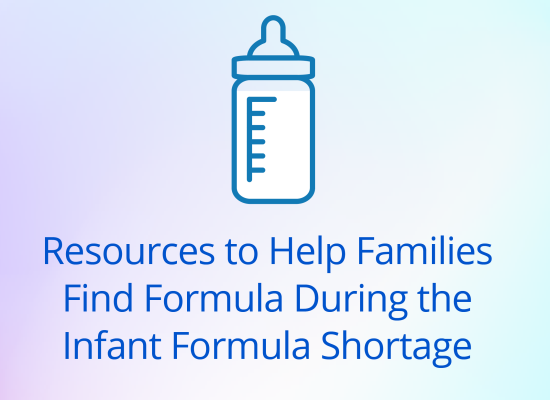
Helpful information and tips to find formula and keep children healthy
The infant formula shortage continues to affect families across the country.
Formula is not only important for babies’ nutrition but also for some young children, teens and adults with medical needs.
Several resources are available nationwide and here in Illinois to help families during the shortage:
- The U.S. Department of Health and Human Services (HHS) website has resources in a variety of languages to help families find infant formula during the shortage. These resources include information on safe substitutes, formula company contacts and community programs.
- The Illinois Department of Human Services (IDHS) has trained caseworkers to help families with formula questions. You can contact the IDHS Help Line at (800) 843-6154. The Help Line is primarily for Supplemental Nutrition Assistance Program (SNAP) and Women, Infants and Children (WIC) participants but is open to all Illinois residents.
- For Illinois WIC participants, a waiver now allows for flexibility in the size and type of formula available to buy with WIC benefits. More details are on IDHS’ “Having Trouble Finding Formula” page.
- Illinois WIC programs also provide a wide range of support for breastfeeding mothers and funds for healthy foods, including fresh fruits and vegetables. More information and updates can be found on the Illinois WIC website. Families can also call (217) 782-2166 for additional support
- Illinois WIC programs also provide a wide range of support for breastfeeding mothers and funds for healthy foods, including fresh fruits and vegetables. More information and updates can be found on the Illinois WIC website. Families can also call (217) 782-2166 for additional support
- HealthyChildren.org, the parenting website of the American Academy of Pediatrics, provides tips on finding baby formula during the shortage and what you may safely consider if you can’t find any. The site is updated regularly with helpful information and the latest guidance.
- The U.S. Food and Drug Administration (FDA) has released information on the international formulas that will soon be on store shelves in the United States. Some of these formulas have different mixing guidance and will require conversion from milliliters to ounces. The FDA has a “Tips for Preparing Imported Infant Formula” handout available to help. (The handout is also available in Spanish.)
Remember that you should not water down your baby’s formula to stretch it out. You also should not make formula at home or discard formula unless it is expired or part of the recall.
HHS notes that in most cases, you can feed your baby any brand of formula that is available.
If your child has special health needs, be sure to check with their doctor about medically appropriate and safe feeding alternatives. Your doctor may have samples in stock or know of other local organizations that can help.
Please contact your pediatrician for guidance on adjusting feeding practices and be sure to stay in touch about any issues or concerns with your child’s nutrition.
Resources for LGBTQ+ Youth With Disabilities and Their Families

DSCC aims to help families strengthen their support to promote young people’s health, safety and wellbeing.
The University of Illinois Chicago’s Division of Specialized Care for Children (DSCC) wants to help Illinois families strengthen their support for LGBTQ+ youth with special healthcare needs and disabilities.
June is Lesbian, Gay, Bisexual, Transgender and Queer (LGBTQ+) Pride Month. There are approximately 5 million LGBTQ+ individuals with disabilities in the United States, according to the nonprofit RespectAbility.
Our DSCC team can provide resources to help our participant families, healthcare providers and community partners understand and support LGBTQ+ youth and their needs.
Research shows that family involvement in an LGBTQ+ youth’s life, particularly in the first two years of coming out, improves their overall safety, health and long-term well-being.
Teaching children about self-awareness and self-care at a young age can lead to better health and safety as a teenager. Helping a child establish boundaries is also linked to better teen health and safety.
Former DSCC Quality Specialist Diane Becker has studied research in these areas. Diane is a nationally certified juvenile treatment specialist and a licensed clinical social worker. She has worked with families and professionals in the social work and counseling fields for 30-plus years.
Diane appeared on the “Just Breathe: Parenting Your LGBTQ Teen” podcast last year to talk about mental health, boundaries and self-care for both LGBTQ+ young adults and parents.
She shared the latest research and discussed the importance of connectedness, family and health and safety.
You can listen to Diane’s two-part interview at the links below –
- What Are These Boundaries You Speak Of? An Interview with Diane Becker Part One
- What Are These Boundaries You Speak Of? An Interview with Diane Becker Part Two
We also encourage Illinois families of LGBTQ+ youth with special healthcare needs to contact us with their questions and concerns. You can call us at (800) 322-3722 or email us at dscc@uic.edu to learn more about available resources and support.
You can also visit our online Resource Directory.
Featured resources that can help support LGBTQ+ youth and their family/caregivers include:
National and Statewide Crisis Hotlines
- Find a Helpline
- National Suicide Prevention Lifeline
- National Domestic Violence Hotline
- The Substance Abuse and Mental Health Services Administration’s (SAMHSA) National Helpline
- Illinois Crisis and Referral Entry Services (CARES) Line
- Illinois Warm Line
- National Runaway Safeline
Connections
- The Trevor Project
- Central Illinois LGBTQ+ Organizations
- Chicago and Illinois Mental Health Agencies and Organizations
- Strong Family Alliance
- PFLAG Parent Support and Resources
- “Expressing, Coping, Reframing: Addressing the Mental Health of ‘Quaranteens’ in the Time of COVID-19”
- It Gets Better Project
Find a Healthcare Provider
- University of Illinois Hospital & Clinics’ Inclusive Healthcare and Policies
- Gender Development Program at Ann & Robert H. Lurie Children’s Hospital of Chicago
- GLMA
- OutCare Provider Directory
Education
- Illinois State Board of Education LGBTQ Student and Family Resources
- Advocating for LGBTQ Students With Disabilities
- Know Your Rights: Students and LGBTQ Rights at School
Information
Remote Learning Tips and Tools for Families
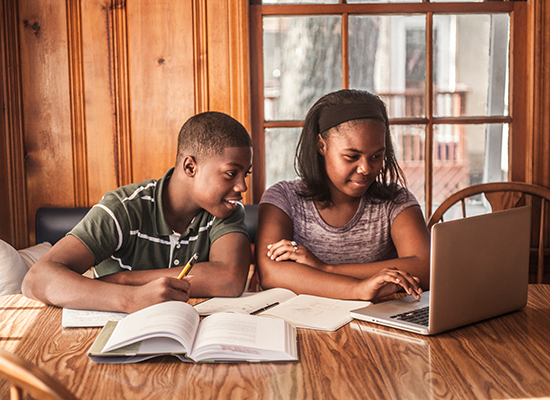
Resources to help support children and youth of all abilities.
This year’s return to school is a partial or completely virtual experience for many Illinois students amid the COVID-19 pandemic.
Parents and caregivers must navigate how to best support their children and make the school year as engaging and beneficial as possible for their unique needs.
To help families adapt to these unusual circumstances, the Division of Specialized Care for Children team has compiled a list of tips and tools for remote learning in the following categories:
- Students With Disabilities
- General Remote Learning
- Condition-Specific
- Early Childhood
- Transition-Age Youth and Adults
We’ve put these items together in our latest resource roundup newsletter.
You can also find each of these resources and many more learning activities in the “Childcare, Learning and Education Tools” section of our COVID-19 Resource Directory
To subscribe to our newsletter, please complete this brief form.
Resources to Discuss Racism and Traumatic Events with Children
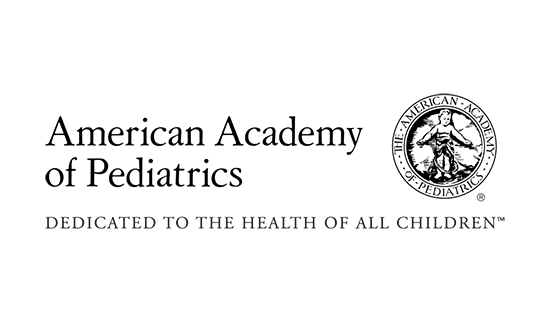
The American Academy of Pediatrics provides helpful resources and tips for families to have these important conversations.
Racism is harmful to our communities.
The Division of Specialized Care for Children (DSCC) shares the University’s commitment to addressing the injustice of racism and promoting equity and inclusion for all.
Racism can create toxic stress in children, teens and families that negatively affects their health and development, according to the American Academy of Pediatrics (AAP).
During these stressful and tumultuous times, families may struggle with how to discuss the issues of race and discrimination with their children.
AAP and HealthyChildren.org, the official parenting website of the AAP, provide the following resources and tips to help your family determine what is age and developmentally appropriate for your child:
Resources for Special Needs Families During COVID-19 Pandemic
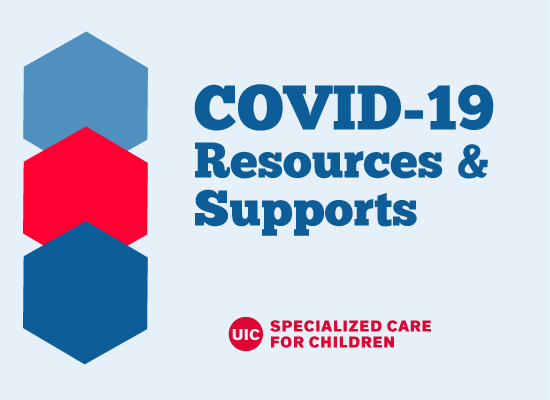
Meals, financial help, health tips, condition-specific information, learning tools and more to support families of children with special healthcare needs.
Parents and caregivers have a lot to juggle as they care for a child with special healthcare needs amid the coronavirus disease 2019 (COVID-19) outbreak.
The uncertainty and required social distancing can pose unique challenges, questions and concerns.
The University of Illinois Chicago’s Division of Specialized Care for Children (DSCC)’s team of professionals is here to help.
We’ve compiled a list of resources to help families find the right support: https://dscc.uic.edu/browse-resources/covid-resources/.
The list includes places offering free meals, utility assistance, free Wi-Fi, health tips, educational websites, activities during social distancing and condition-specific information.
Resources are also broken down by our regional office locations.
We’ll continue to update this list as new resources become available. Please check back often for the latest information.
If you have a resource to add to our list, please email us at dscc@uic.edu.
Resources to Help Youth Cope with Traumatic Events
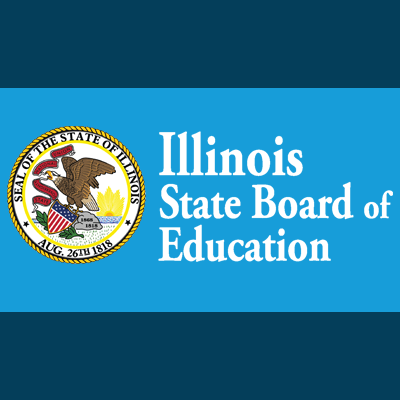
State Board shares resources for children, families and educators.
In response to the mass shooting in Las Vegas, the Illinois State Board of Education has compiled a list of resources for parents and educators to help children and youth handle traumatic events. The list was shared in a recent Weekly Message from State Superintendent Tony Smith, Ph.D.:
- Coping with Traumatic Events: Resources for Children, Parents, Educators, and Other Professionals from the Substance Abuse and Mental Health Services Administration (SAMHSA)
- Helping Children and Adolescents Cope with Violence and Disasters: What Parents Can Do from the National Institute of Mental Health
- Helping Kids After a Shooting from the American School Counselor Association
- Resources from the National Child Traumatic Stress Network
- Talking to Children About Tragedies & Other News Events from the American Academy of Pediatrics
Additional resources from the State Board on a variety of topics are available at https://www.isbe.net/Pages/Climate-and-Culture.aspx.



